
Urbi et Orbi ('to the city [of Rome] and to the world') denotes a papal address and apostolic blessing given by the pope on certain solemn occasions.

Urbi et Orbi ('to the city [of Rome] and to the world') denotes a papal address and apostolic blessing given by the pope on certain solemn occasions.
The term Urbi et Orbi evolved from the consciousness of the ancient Roman Empire. The invocation is expressed by the pope in his capacity as both the bishop of Rome (urbs = city; urbi the corresponding dative form; compare: urban) and the head of the Roman Catholic Church throughout the world (orbis = earth; orbi the corresponding dative form; compare: orbit).[ citation needed ]
The formula is found more frequently in the language of the Church, as in the inscription at the Lateran Basilica, which is: omnium urbis et orbis Ecclesiarum mater et caput [1] (the head and mother of all churches of the city and of the earth; the principal and mother of all churches of the world).[ citation needed ]
In the 4th century, Pope Damasus I wrote in a letter to the bishops of Illyricum: Unde iustum est, omnes in Universo Romanorum Orbe Doctores legis, ea, quae legis sunt, sapere, et non fidem doctrinis variis maculare [2] (tr. Hence, it is just, that all doctors of the law in the Universe of the World of the Romans, those, who are of the law, are wise, and do not teach the faith with various doctrines.)
The ritual of the papal blessing Urbi et Orbi developed in the 13th century during the reign of Pope Gregory X, who consulted Niccolò and Maffeo Polo before his election. [3] [4]
This section needs additional citations for verification .(July 2021) |
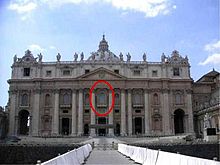
The Urbi et Orbi address and blessing is the most solemn form of blessing in the Catholic Church, and is reserved for the most solemn occasions. These occasions include Easter, Christmas, and the proclamation of a newly elected pope concluding a conclave.
Urbi et orbi blessings are usually given from the central loggia of Saint Peter's Basilica in Rome, at noontime, and are broadcast worldwide through the European Broadcasting Union and other linkups. The address concludes with greetings in many languages in relation to the feast celebrated.
The Roman Catholic Church grants a plenary indulgence by the willful grace and intent of the pope, on the usual conditions, to those who "devoutly receive" the blessing that the pope imparts Urbi et Orbi.
For any ordinary plenary indulgence, the "usual conditions" are:
Gaining a plenary indulgence requires that a baptized Roman Catholic must also exclude any attachment to sin, even venial sin. [5]
Since 1985, this indulgence is granted not only to the people in Saint Peter's Square, but also to those who though unable to be physically present, "piously follow" it by radio or television. [6] [7]
This is now extended to all who receive the papal blessing over the Internet ("the new communications medium"), since the blessing is preceded by an announcement by a cardinal (usually the cardinal protodeacon): "His Holiness Pope N. grants a plenary indulgence in the form laid down by the Church to all the faithful present and to those who receive his blessing by radio, television and the new communications media. Let us ask Almighty God to grant the Pope many years as leader of the Church and peace and unity to the Church throughout the world." [8]
The only yearly occasions for the Urbi et Orbi blessing are Christmas and Easter. Besides that, another systematic occasion for the Urbi et Orbi comes at the end of a papal conclave when the new pope makes his first appearance to the world following his election. In addition, Popes John Paul II, Benedict XVI, and Francis started with a short speech, with the latter requesting prayers from the faithful, and John Paul II deliberately mispronouncing the word “correct” in Italian in an effort to gain the support of the followers below.[ citation needed ] The people were nervous about having a non-Italian as pope for the first time since the Dutch born Pope Adrian VI who reigned from January 1522 to September of 1523.
On 27 March 2020, Pope Francis imparted an extraordinary Urbi et Orbi blessing in response to the COVID-19 pandemic. [9] He stood in the door of Saint Peter's Basilica, at the head of Saint Peter's Square (without the presence of the public) following a prayer. [10] For this blessing, the Apostolic Penitentiary loosened the requirements to receive the Eucharist and go to confession, due to the impossibility for people affected by lockdowns and suspension of liturgies. [11] The Salus Populi Romani image and the crucifix from the church of San Marcello al Corso were brought to the square for the occasion. The Pope did not use the formula of the apostolic blessing; instead, he performed a Benediction of the Blessed Sacrament. [12] [13]
This section needs additional citations for verification .(July 2021) |
From Pope Paul VI to Pope Benedict XVI, after delivering their Urbi et Orbi message, the pope would greet the different nations in their native languages. The pope typically began by saying: "To those who listen to me, I address a cordial greeting in the different language expressions." Pope Francis has since stopped this practice.
| Language | Easter (transcription) [14] | Christmas (transcription) [15] |
|---|---|---|
| Italian | Buona Pasqua a voi, uomini e donne di Roma e d’Italia! | Buon Natale agli abitanti di Roma e dell’intera Italia! |
| French | Le Christ est ressuscité. Sainte fête de Pâques ! Que pour vous ce mystère soit source de bonheur et de paix profonde. | Heureuse et sainte fête de Noël ! Que le Christ Sauveur vous garde dans l’espérance et qu’il vous fasse le don de la paix profonde ! |
| English | May the grace and joy of the Risen Christ be with you all. | May the birth of the Prince of Peace remind the world where its true happiness lies; and may your hearts be filled with hope and joy, for the Saviour has been born for us. |
| German | Euch allen ein gesegnetes und frohes Osterfest! Der Friede und die Freude des auferstandenen Herrn sei mit Euch. | Die Geburt Jesu Christi, des Erlösers der Menschen, erfülle Euer Leben mit tiefer Freude und reicher Gnade; sein Friede möge in Euren Herzen wohnen. Gesegnete und frohe Weihnachten! |
| Spanish | Os deseo a todos una buena y feliz fiesta de Pascua, con la paz y la alegría, la esperanza y el amor de Jesucristo Resucitado. | ¡Feliz Navidad! Que la Paz de Cristo reine en vuestros corazones, en las familias y en todos los pueblos. |
| Portuguese | Uma Páscoa feliz com Cristo Ressuscitado. | Feliz Natal para todos! O nascimento do Menino Jesus ilumine de alegria e paz vossos lares e Nações! |
| Dutch | Zalig Pasen! Ik wil mijn hartelijke dank tot uitdrukking brengen voor de fraaie bloemen uit Nederland voor de Paasmis op het Sint Pietersplein. | Zalig en gelukkig Kerstmis. |
| Luxembourgian | Frou a geseent Oushteren. | Schéin Chreschtdag. |
| Greek | Χριστός άνέστη (Christós ánésti̱) | Καλά Χριστούγεννα (Kalá Christoúgenna) |
| Albanian | Për shumë wjet Pashkët. | Per shum vjet Krishtlindjen. |
| Romanian | Cristos a ínviat. | Sărbători Fericite de Crăciun si Anul Nou. |
| Hungarian | Krisztus feltámadott. Alleluja. | Áldott Karácsonyt. |
| Polish | Chrystus zmartwychwstał. | Błogosławionych świąt Bożego Narodzenia. |
| Sorbian | Chrystus z mortwych stanył. | Zohnowane hody! A zbožowne Nowe lěto! |
| Czech | Kristus vstal z mrtvých. | Narodil se vám Spasitel. Radujte se! |
| Slovak | Radostné veľkonočné sviatky. | Milostiplné a radostné Vianočné Sviatky. |
| Slovene | Blagoslovljene velikonočne praznike. | Božje Dete, naj vam podeli svoj blagoslov. |
| Croatian | Sretan Uskrs! | Sretan Božić, Isusovo Porođenje! |
| Serbian | Христос васкрсе! (Hristos vaskrse!) | Среħан Божиħ – Христос се роди! (Srećan Božić – Hristos se rodi!) |
| Macedonian | Христос Воскресна. (Hristos Voskresna.) | Нека ви е честит Божиќ и Нова Година (Neka vi e čestit Božiḱ i Nova Godina) |
| Bulgarian | Христос възкресе (Khristos vŭzkrese) | Честито Рождество Христово (Chestito Rozhdestvo Khristovo) |
| Russian | Христос Воскресе. (Hristos Voskrese.) | Сердечно поздравляю всех с Праздником Рождества Христова (Serdechno pozdravlyayu vsekh s Prazdnikom Rozhdestva Khristova) |
| Byelorussian | Christos uvaskrós. | Viasiòłych kalàdnych Sviàtaû! |
| Ukrainian | Христос Воскрес! (Khrystos Voskres!) | Веселих Свят з Різдвом Христовим і Новим Роком! (Veselykh Svyat z Rizdvom Khrystovym i Novym Rokom!) |
| Mongolian | ХРИСТИЙН ДАХИН АМИЛАЛЫН БАЯРЫН МЗНД ХУРГЗЕ! Khristiin Dakhin Amilalyn Bayaryn Mendkhurgeye! | Hristijn Tersen Edrijn mendhurgie |
| Kazakh | Иса тірілпті (Ïsa tirilpti) | Родecтвo мepeкeci ктты болсын! (Rodectvo mepekeci kttı bolsın!) |
| Lithuanian | Linksmų Šventų Velykų. | Linksmų Šventų Kalėdų. |
| Latvian | Priecīgas lieldienas. | Priecīgus Ziemsvētkus! |
| Estonian | Kristus on surnuist üles tõusnud. | Häid jõulupühi. |
| Finnish | Siunattua pääsiäistä. | Hyvää joulua. |
| Swedish | Glad påsk. | God jul, gott nytt år. |
| Icelandic | Gleðilega Páska. | Gleðileg jól! |
| Irish | Beannacht na Cásca dhaoibh go léir. | Nollaig shona dhaoibh go léir. |
| Romani | Lachi Patrači. | Baxtalò Krečùno! Thaj Nevo berš! |
| Maltese | L-Għid it-tajjeb. | Il-Milied it-tajjeb lill-poplu kollu ta' Malta u Għawdex. |
| Georgian | K’riste Aghsdga | Gilotsavt Krist’es Shobas |
| Turkish | Paskalya bayramini kutlarim. | Noel bayramı kutlu olsun. |
| Arabic | El Messieh kahm! Hakken kahm! | Miládon-mazídon |
| Ethiopian-Eritrean | Burúk Fasika | Burúk ledét |
| Hebrew | Brachot le Chag HaPesach. | Hamashiach Nolad. Chag Molad Mevorach. |
| Aramaic | Qmlēh maran Shwubuḥaʾ lshemēh | Hwylēh maran Shwubuḥaʾ lshemēh |
| Armenian | Kuhreestos harryav ee merrelotz | Sznorawórsz surp dz'nunt |
| Swahili | Heri na baraka zangu kwa sikukuu ja Pasaka kwenu wote. | Heri kwa noeli na baraka nyingi kwa mwaka mpya. |
| Kirundi and Kinyarwanda | Pasika Nziza, mwese. | Gumya umutima mu mahoro! Noeli nziza! |
| Malagasy | Arahaba Tratry Ny Paka. | Arahaba tratrin'i Noely. |
| Hindi | पास्का की शुभकामनाएं (Paaska kee shubhakaamanaen) | ख्रिस्त के जन्म उत्सव की शुभकामनाएं (Khrist ke janm utsav kee shubhakaamanaen) |
| Tamil | Kiṟistu uyirppu nāḷil uṅkaḷ ellōrukkum eṉ vāḻttukkaḷ! | கிறிஸ்து பிறந்த தின வாழ்த்துக்கள் (Kiṟistu piṟanta tiṉa vāḻttukkaḷ) |
| Malayalam | ഉയിര്പ്പു തിരുനാളില് എല്ലാവർക്കും ഹൃദയുംഗമായ മുംഗളങ്ങള് (Uyirppu thirunaalil ellaavarkkum hrudayamgamaaya mangalangal) | തിരുപിറവിയുടെ ആശുംസകള് നനരുന്നു (Thiruppiraviyute aashamsakal nerunnu) |
| Bengalese | ||
| Burmese | ||
| Urdu (Pakistan) | Eid e Qayamat al Masih mubarak ho | Eid e Wiladat al Masih mubarak ho |
| Chinese | 復活節快樂 / 复活节快乐 (Fùhuójié kuàilè) | 聖誕節快樂 / 圣诞节快乐 (Shèngdànjié kuàilè) |
| Japanese | ご復活おめでとうございます (Go fukkatsu omedetō gozaimasu) | クリスマスと新年おめでとうございます。 (Kurisumasu-to shínnen omédetō gozáimasu) |
| Korean | 부활을 축하합니다 (buhwal-eul chughahabnida) | 기쁜 성탄에 한국의 평화를 비노라 (gippeun seongtan-e hangug-ui pyeonghwaleul binola) |
| Vietnamese | Mừng lễ Phục sinh. | Chúc mừng Giáng sinh. |
| Sinhalese | Śrī laṁkāvāsī obaṭa halelūyā! | Natthal Saamaya Oba Semata Labewaa! |
| Thai | สุขสันต์วันปัสกาแด่ชาวไทยทุก ๆ ท่าน! (S̄uk̄h s̄ạnt̒ wạn pạs̄kā dæ̀ chāw thịy thuk thuk th̀ān) | สุขสันต์วันคริสตสมภพ แด่พี่น้องชาวไทยที่รักทุกคน! (S̄uk̄hs̄ạnt̒ wạn khris̄t̒mās̄ s̄mp̣hph dæ̀ phī̀n̂xng chāw thịy thī̀rạk thuk khn) |
| Indonesian | Selamat Paskah. | Selamat Hari Natal. |
| Cambodian | Serea suosdei Bonchamlong. | Rīkarāy Bon Noel |
| Filipino | Maligayang Pasko ng Pagkabuhay. | Maligayang Pasko at Manigong Bagong Taon. |
| Maori | Nga mihi o te Aranga ki a koutou. | Meri Kirihimete. |
| Samoan | Ia manuia le Efeta. | Ia manuia le Kirisimasi. |
| Esperanto | Feliĉan Paskon en Kristo resurektinta. | Dibenitan Kristnaskon kaj prosperan novjaron. |
| Guaraní | Ña nerenyhe vy’agui, Aleluya. | Ko navidad árape che maitei ame'ê peême. |
| Latin | Different greeting every year | |
Prior to the occupation of Rome by the army of the Kingdom of Italy (20 September 1870), this blessing was given more frequently and at specific basilicas at Rome:
On the occasion of a Holy Year the pope gave the blessing on other occasions too for the benefit of pilgrims. In the jubilee year of 1650 Pope Innocent XI did so at Epiphany, Pentecost, and All Saints. He and later popes gave such special-occasion blessings from the balcony of the Quirinal Palace, which was then the papal residence. [16]
After the occupation, Pope Pius IX considered himself a "prisoner in the Vatican" and in protest ceased to give the blessing. The practice was later resumed, though in a more limited manner, following the resolution of the so-called "Roman Question" (i.e., the legal relationship between the Holy See and the Italian government).[ citation needed ]
It is the motto of Long Island University.[ citation needed ]
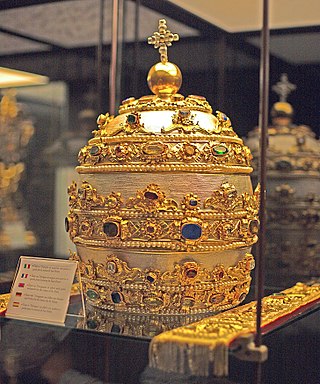
The papal tiara is a crown that is worn by popes of the Catholic Church from as early as the 8th century to the mid–20th century. It was last used by Pope Paul VI in 1963, and only at the beginning of his reign.

A papal coronation is the formal ceremony of the placing of the papal tiara on a newly elected pope. The first recorded papal coronation was of Pope Nicholas I in 858. The most recent was the 1963 coronation of Paul VI, who soon afterwards abandoned the practice of wearing the tiara. To date, none of his successors have used the tiara, and their papal inauguration celebrations have included no coronation ceremony, although any future pope may elect to restore the use of the tiara at any point during his pontificate.
A jubilee is a special year of remission of sins, debts and universal pardon. In Leviticus, a jubilee year is mentioned to occur every 50th year; during which slaves and prisoners would be freed, debts would be forgiven and the mercies of God would be particularly manifest.

In the teaching of the Catholic Church, an indulgence is "a way to reduce the amount of punishment one has to undergo for (forgiven) sins". The Catechism of the Catholic Church describes an indulgence as "a remission before God of the temporal punishment due to sins whose guilt has already been forgiven, which the faithful Christian who is duly disposed gains under certain prescribed conditions…"
In the Catholic Church, the Apostolic Pardon is an indulgence given for the remission of temporal punishment due to sin. The Apostolic Pardon is given by a priest, usually along with Viaticum. It is not usually given as part of the sacrament of Anointing of the Sick. However, if the Anointing of the Sick is given with Viaticum, in exceptional circumstances or an emergency, it may be given then..

A Holy Door is traditionally an entrance portal located within the Papal major basilicas in Rome. The doors are normally sealed by mortar and cement from the inside so that they cannot be opened. They are ceremoniously opened during Jubilee years designated by the Pope, for pilgrims who enter through those doors may piously gain the plenary indulgences attached with the Jubilee year celebrations.

The Great Jubilee in 2000 was a major event in the Catholic Church, held from Christmas Eve 1999 to Epiphany 2001. Like other previous Jubilee years, it was a celebration of the mercy of God and forgiveness of sins. The major innovation in this Jubilee was the addition of many "particular Jubilees" for various groups of persons, and that it was simultaneously celebrated in Rome, Israel, and elsewhere in the world.

The Angelus is a Catholic devotion commemorating the Incarnation of Christ. As with many Catholic prayers, the name Angelus is derived from its incipit—the first few words of the text: Angelus Domini nuntiavit Mariæ. The devotion is practised by reciting as versicle and response three Biblical verses narrating the mystery, alternating with the prayer "Hail Mary". The Angelus exemplifies a species of prayers called the "prayer of the devotee".

A Papal Mass is the Solemn Pontifical High Mass celebrated by the Pope. It is celebrated on such occasions as a papal coronation, an ex cathedra pronouncement, the canonization of a saint, on Easter or Christmas or other major feast days.

The Confiteor is one of the prayers that can be said during the Penitential Act at the beginning of Mass of the Roman Rite in the Catholic Church. It is also said in the Lutheran Church at the beginning of the Divine Service, and by some Anglo-catholic Anglicans before Mass.

As the home of the Pope and the Catholic curia, as well as the locus of many sites and relics of veneration related to apostles, saints and Christian martyrs, Rome had long been a destination for pilgrims. The Via Francigena was an ancient pilgrim route between England and Rome. It was customary to end the pilgrimage with a visit to the tombs of Saints Peter and Paul. Periodically, some were moved to travel to Rome for the spiritual benefits accrued during a Jubilee. These indulgences sometimes required a visit to a specific church or churches. Pilgrims need not visit each church.

The Scala Sancta are a set of 28 white marble steps located in an edifice on extraterritorial property of the Holy See in Rome, Italy proximate to the Archbasilica of Saint John in Laterano. Officially, the edifice is titled the Pontifical Sanctuary of the Holy Stairs, and incorporates part of the old Papal Lateran Palace. Replica stairs flank the original staircase, which may only be climbed on one's knees. The Holy Stairs lead to the Church of Saint Lawrence in Palatio ad Sancta Sanctorum or simply the "Sancta Sanctorum", which was the personal chapel of the early Popes.

A canonical coronation is a pious institutional act of the pope, duly expressed in a formal decree of a papal bull, in which the pope bestows the pontifical right to impose an ornamental crown, a diadem or an aureole to an image of Christ, Mary or Joseph that is widely venerated in a particular diocese or locality.
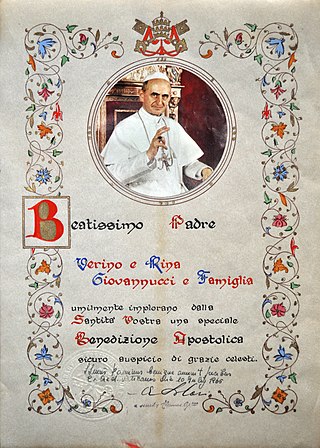
The apostolic blessing or papal blessing is a blessing imparted by the pope, either directly or by delegation through others. Bishops are empowered to grant it three times a year and any priest can do so for the dying.
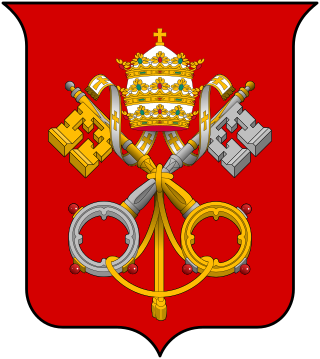
The Diocese of Rome, also called the Vicariate of Rome, is a Latin diocese of the Catholic Church under the direct jurisdiction of the Pope, who is Bishop of Rome and hence the supreme pontiff and head of the worldwide Catholic Church. As the Holy See, the papacy is a sovereign entity with diplomatic relations, and civil jurisdiction over the Vatican City State located geographically within Rome. The Diocese of Rome is the metropolitan diocese of the province of Rome, an ecclesiastical province in Italy. According to Catholic tradition, the first bishop of Rome was Saint Peter in the first century. The incumbent since 13 March 2013 is Pope Francis.
Indulgentarium Doctrina is an apostolic constitution about indulgences issued by Pope Paul VI on 1 January 1967. It responds to suggestions made at the Second Vatican Council, it substantially revised the practical application of the traditional doctrine relating to indulgences. The title is taken from the opening words of the original Latin text.

The Lateran Cross is a medal for recognition of merit. It was bestowed by the Cathedral chapter of the Archbasilica of Saint John Lateran with authorisation of the Holy See.
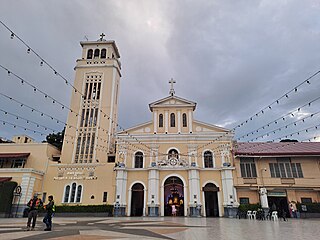
The Minor Basilica of Our Lady of the Holy Rosary of Manaoag, commonly known as The Church of Manaoag, is a Roman Catholic minor basilica located in Manaoag, Pangasinan in the Philippines.

The COVID-19 pandemic that started in 2020 has significantly impacted liturgical celebrations of the Catholic Church worldwide. The Pontifical Foundation Aid to the Church in Need (ACN) stated that the pandemic has become not "just a medical, social and economic problem, but also a pastoral problem", which led ACN to start encouraging a special program for the actions of priests and religious against the virus spread.
Events in the year 2020 in Vatican City.